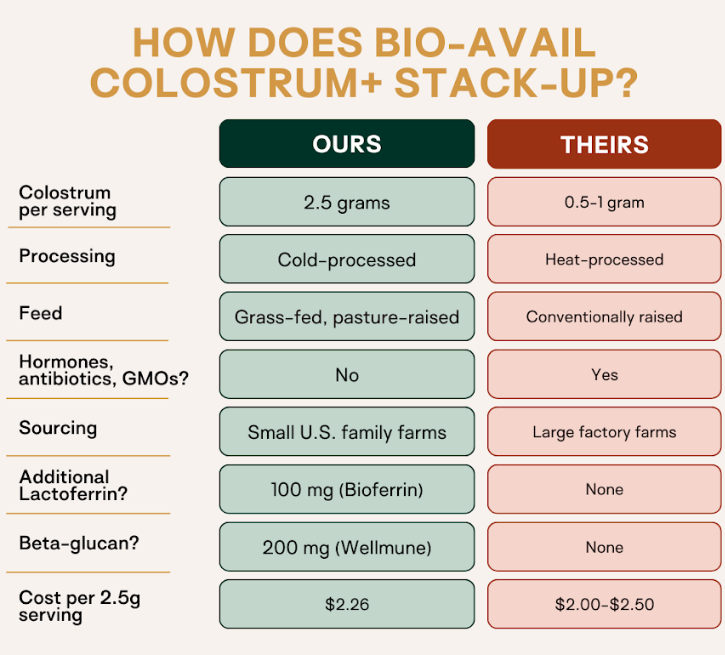
8 Tips for Choosing the Best Colostrum Supplement
Colostrum, often referred to as “first milk,” is a nutrient-rich fluid produced by mammals in the first few days after giving birth. It’s packed with antibodies, growth factors, and other bioactive compounds that support immune health, digestion, and overall vitality. As interest in colostrum supplements grows, it’s crucial to understand how to choose a high-quality product that delivers real benefits.
In this article, we’ll explore eight key factors to consider when selecting a colostrum supplement. By understanding these elements, you’ll be better equipped to make an informed decision and choose a product that offers the most potential health benefits.
1. Dose of Colostrum per Serving
The amount of colostrum in each serving is a critical factor in a supplement’s effectiveness. Many products on the market contain as little as 0.5 to 1 gram per serving, which may not provide significant benefits.
Research suggests that a dose of 2 grams or more per day is needed to see substantial effects. For example, a 2024 meta-analysis of randomized controlled trials of colostrum supplementation in healthy athletes and individuals found that doses of 2-3 grams per day produced greater benefits than doses below 2 grams per day. (1)
When evaluating colostrum supplements, look for products that provide at least 2 grams of colostrum per serving to ensure you’re getting an effective dose.
2. Sourcing: Grass-Fed vs. Conventional
The quality of colostrum is directly influenced by the health and diet of the cows that produce it. Cows raised on small, family-owned farms and fed a natural, grass-based diet tend to produce colostrum that’s richer in beneficial compounds.
A 2018 study found that milk from grass-fed cows contained higher levels of beneficial fatty acids and antioxidants compared to milk from conventionally raised cows. (2) While this study focused on milk rather than colostrum, it suggests that the diet and living conditions of cows can significantly impact the nutritional profile of their milk products.
When choosing a colostrum supplement, opt for products sourced from grass-fed cows raised on small farms. This not only ensures a higher quality product but also supports more sustainable and ethical farming practices.
3. Purity: Absence of Hormones, Antibiotics, and GMOs
The presence of contaminants like hormones, antibiotics, and genetically modified organisms (GMOs) in colostrum supplements can potentially negate health benefits and introduce unwanted side effects.
Residual antibiotics in animal products can contribute to antibiotic resistance, a growing public health concern. (3) Additionally, some studies suggest that growth hormones used in conventional dairy farming may have negative health impacts. (4)
Look for colostrum supplements that are certified free from hormones, antibiotics, and GMOs. Reputable manufacturers will often have third-party certifications to verify these claims.
4. Processing Method: Cold vs. Heat
The way colostrum is processed can significantly impact its nutritional value and effectiveness. Heat processing, while more cost-effective for manufacturers, can denature proteins and destroy many of the delicate immune factors and growth hormones that make colostrum beneficial. (5)
Cold processing, on the other hand, preserves these bioactive compounds. This process involves brief exposure to gentle heat to pasteurize the colostrum and make it safe for consumption without the prolonged exposure to high temperatures that denatures the fragile proteins.
When selecting a colostrum supplement, prioritize products that use cold processing methods to ensure you’re getting the full spectrum of bioactive compounds intact.
5. Third-Party Testing and Certification
In an industry where quality can vary widely, third-party testing provides an extra layer of assurance. Independent laboratory testing can verify the purity, potency, and safety of colostrum supplements.
Look for products that undergo rigorous testing by reputable third-party laboratories. The best supplement brands will make these test results readily available to consumers, often through their website or upon request.
Manufacturer certifications from organizations like NSF International or USP (United States Pharmacopeia) can also indicate a commitment to quality and safety standards.
6. Presence of Supportive Ingredients
While pure colostrum offers numerous benefits, some supplements include additional ingredients that can enhance its effects. Two notable examples are lactoferrin and beta-glucan.
Lactoferrin is an iron-binding protein found naturally in colostrum that has antimicrobial and immune-modulating properties. (6) Beta-glucan is a type of fiber that has been shown to enhance immune function. (7)
When these ingredients are combined with colostrum, they can create a synergistic effect, potentially amplifying the overall health benefits of the supplement.
7. Cost-Effectiveness
While price shouldn’t be the sole determining factor, it’s important to consider the value you’re getting for your money. Some high-priced colostrum supplements may not offer significantly better quality or higher doses than more affordable options.
Compare the cost per serving of colostrum (accounting for the dose per serving) across different products. Remember that factors like sourcing from grass-fed cows, cold processing, third-party testing, and the presence of supportive ingredients like lactoferrin and beta-glucan can justify a higher price point due to the superior quality they provide.
8. Formulation by Reputable Health Professionals
Supplements formulated by respected clinicians and health experts are more likely to be based on current research and clinical experience. These professionals often have a deep understanding of how different compounds work in the body and can create more effective formulations.
Look for colostrum supplements developed by practitioners with expertise in functional medicine, immunology, or related fields. Their involvement can be a good indicator of a thoughtfully designed, science-based product.
Putting It All Together: Bio-Avail Colostrum+
After considering all these factors, one product that stands out is Bio-Avail Colostrum+. This supplement—which I formulated after 15 years of experience as a Functional Medicine clinician, educator, and author—meets all the criteria for a high-quality colostrum supplement we’ve discussed in this article.
Here’s how Bio-Avail Colostrum+ compares to typical colostrum supplements:

Bio-Avail Colostrum+ provides 2.5 grams of colostrum per serving, sourced from grass-fed cows raised on small U.S. family farms. It’s free from hormones, antibiotics, and GMOs, and uses cold processing to preserve bioactive compounds. The formula also includes 100 mg of lactoferrin and 200 mg of beta-glucan for enhanced benefits. It’s a 3-in-1 immune, gut health, and natural beauty powerhouse!
Every batch of Bio-Avail Colostrum+ undergoes rigorous third-party testing, with results available on Adapt Naturals’ website. While it may not be the least expensive option on the market, its combination of high-quality sourcing, effective dosing, and additional supportive ingredients offers excellent value for those seeking a premium colostrum supplement.
Conclusion
Choosing a high-quality colostrum supplement involves considering multiple factors, from the dose and sourcing to processing methods and additional ingredients. By keeping these eight tips in mind, you can make an informed decision and select a product that offers the most potential health benefits.
Remember, while colostrum can be a valuable addition to your health regimen, it’s not a magic bullet. As with any supplement, it’s best used as part of a comprehensive approach to health that includes a nutrient-dense diet, regular exercise, stress management, and adequate sleep.
If you’re considering adding a colostrum supplement to your routine, I encourage you to apply these criteria in your search. And if you’re looking for a product that meets all these standards, you might want to give Bio-Avail Colostrum+ a try.






